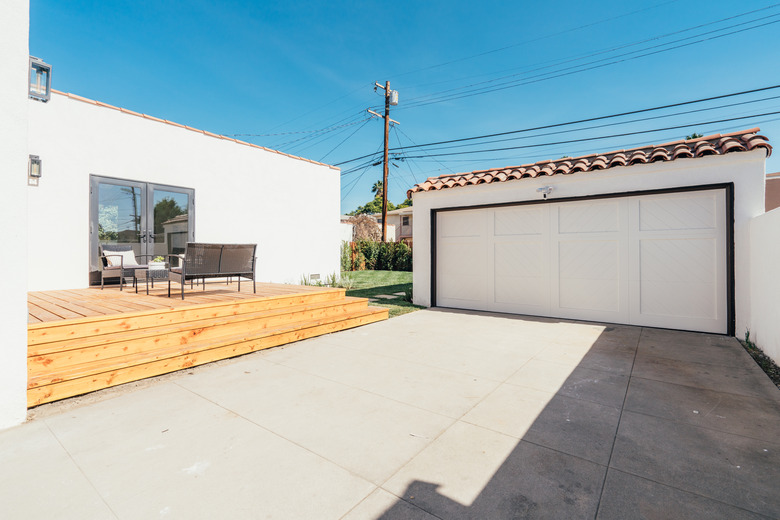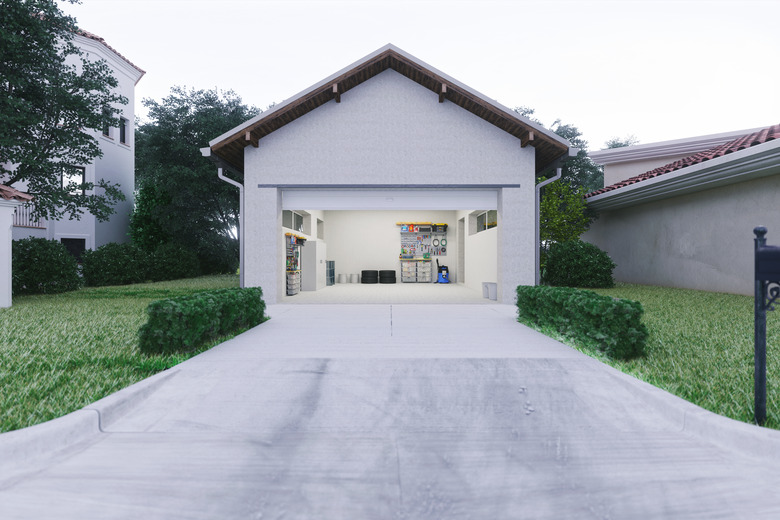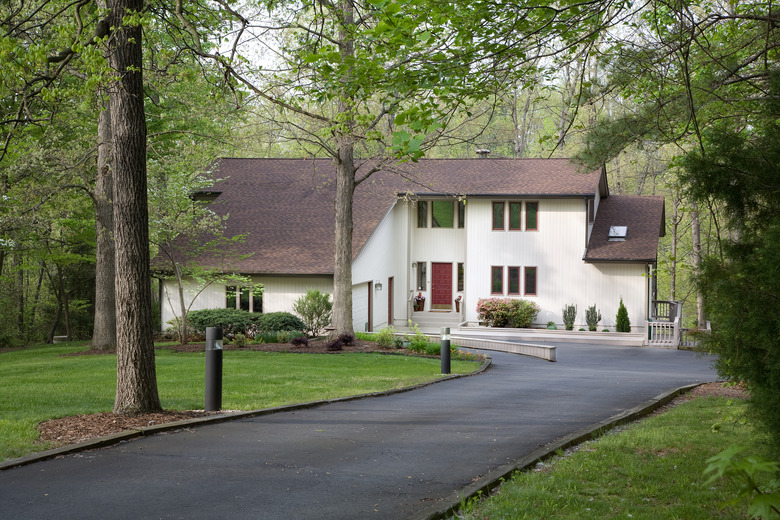Concrete Vs. Asphalt Driveway: What You Need To Know
We may receive a commission on purchases made from links.
If you are thinking about installing a new driveway or replacing your existing one, your choices are likely to come down to either a concrete driveway or an asphalt driveway. Though there are other materials available for driveways, concrete and asphalt are by far the most popular driveway materials used for solid driveways. And although the aesthetics are completely different, concrete and asphalt are both made of the same primary materials: sand and stone or gravel.
Concrete and asphalt are installed with a base of gravel—but the thing that makes these two materials so different is the binding agent that holds the components together. Concrete uses cement as a binding agent, while asphalt uses bitumen, an oil-based material that also gives asphalt its dark coloring.
When choosing between concrete and asphalt, the decision ultimately comes down to cost and how your particular climate will affect the look and durability of the driveway.
Climate Affects Concrete and Asphalt
Climate Affects Concrete and Asphalt
The weather where you live will definitely play a part in how well a concrete or asphalt driveway will hold up. A concrete driveway will not soften in high temperatures, making it a much better choice for warmer climates. It also stays cooler, making it much better for walking and parking vehicles. With a concrete driveway, motorcycle owners don't have to worry about kickstand indentations that can result in asphalt on hot, sunny days.
Asphalt, on the other hand, can become soft and sticky in very high temperatures, and fluctuating between hot and cold temperatures can result in cracks. However, while concrete is a better choice for warm, sunny climates, asphalt driveways perform much better in cold climates. This is because the bitumen that binds asphalt is a more flexible material that expands and contracts more easily. While it may become soft on extremely hot days, it is also less likely to heave and crack in the freezing cold.
Because of its black color, snow and ice will melt much quicker on asphalt, adding to its benefits in cold climates. Snow and ice don't melt as quickly on concrete, and salt, which is commonly used on roads, driveways and sidewalks to melt ice, is very damaging to concrete surfaces and can pit and blotch a concrete driveway. Even if salt is not put directly on a concrete driveway, the salt dripping off a car in the wintertime can have damaging effects. However, when salt is put down on asphalt, it will not harm or damage it in any way.
Concrete vs. Asphalt Driveway Durability
Concrete vs. Asphalt Driveway Durability
Concrete is very durable and will last a long time, giving it the edge in longevity. According to Everything About Concrete, a concrete driveway is 5 to 6 inches thick, making it stronger and more durable than an asphalt driveway, which is only 2 to 3 inches thick. This increased thickness and strength results in a longer life span for a concrete driveway.
A well-installed concrete driveway with a stable gravel sub-base can last between 30 and 40 years, about twice as long as an asphalt driveway. An asphalt driveway, while still lasting a long time, has a shorter life span than a concrete driveway, usually lasting about 15 to 20 years. Several factors can affect this, including climate and how well a driveway is maintained, but on average, a concrete driveway will outlast an asphalt one.
Asphalt and Concrete Driveway Maintenance
Asphalt and Concrete Driveway Maintenance
Just like any other feature of your home, a driveway requires proper maintenance—but these two driveway materials have different requirements for upkeep. A concrete driveway is usually quite low maintenance, needing just the occasional cleaning. Sealing a concrete driveway is not a necessity, but it does help prevent fading and can be quickly and easily sprayed on. Asphalt may be much easier to repair than concrete, but it will require more frequent maintenance. Asphalt will crack at some point regardless of climate, requiring the cracks to be filled in.
An asphalt driveway will crack more often than concrete but is less likely to crack during cold winters and is relatively easy to repair. Damage to an asphalt driveway can be patched, cracks can be fixed with a rubber sealer and the repair is often unnoticeable. When concrete cracks, it is more difficult to repair than asphalt, and repaired areas tend to stand out because it's difficult, if not impossible, to match the color when repairing concrete. Along with being difficult to perform and unsightly, repairs to a concrete driveway tend to cost more than repairs to asphalt.
An asphalt driveway should be sealed every few years to keep it looking better and to help increase the life span of your driveway. While asphalt hides wear and stains from oil and other drips very well, stains show up very easily on concrete because of its light color, and they are very difficult to remove. A sealer can be applied to reduce fading, but dark grease and oil stains will be highly visible. These stains require thorough cleaning to remove them, and sometimes even that will not entirely remove a stain from a concrete driveway.
Driveway Installation Time
Driveway Installation Time
The amount of time needed to install either a concrete or asphalt driveway depends on the size and design of the driveway, but in general, a concrete driveway takes longer to pour than an asphalt one. A concrete driveway may take one to three days to install, while an asphalt one can usually be completed within a few hours once the gravel base is installed.
A newly installed concrete driveway also takes a long time to set. This means waiting several days, usually at least a week and sometimes more before it can be used. For people with limited on-street parking available, installing a concrete driveway can mean having to make arrangements to park somewhere else for a least a week. Asphalt cures quickly by comparison and can be used and parked on within a few days, sometimes as quickly as two days.
Decorative Driveway Finishes
Decorative Driveway Finishes
One of the areas where concrete has a real advantage over asphalt is the number of decorative finishes that are available for it. Decorative finishes can add to the curb appeal of a house. The most popular finish is a broom finish, which has a slightly rough, nonslip texture. It is created by pulling or pushing a broom over the concrete while it is setting.
Another popular concrete driveway finish option is a stamped driveway, where large stamping tools and molds are pressed into the concrete's surface while it is still wet to add various patterns and texture to the driveway. A concrete driveway can also be stained or tinted a variety of colors by applying a concrete stain and sealing over it. Decorative patterns and emblems can also be applied to your driveway with stains.
While concrete can be stained and stamped with a variety of finishes, asphalt comes only in different shades of black and cannot be stained or tinted, leaving it with no decorative options. For this reason, an asphalt driveway is seen as less aesthetically pleasing and gives a home less curb appeal than concrete.
Concrete and Asphalt Driveway Prices
Concrete and Asphalt Driveway Prices
The cost of installing a concrete driveway is considerably higher than asphalt driveway costs, often setting you back between 40 and 50 percent more—running you about $8–$12 per square foot according to Concrete Network. Finishes such as stamping or staining can raise the cost of a concrete driveway even higher. Lower asphalt costs combined with the ease of maintenance can make it a more cost-effective choice for homeowners on a tight budget. However, there is a flip side to this because a concrete driveway can improve the value of a home due to its curb appeal and the number of finish options available.


